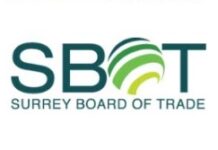
“THE federal government’s 2017 budget initiates $5.7 billion in new spending. The Surrey Board of Trade now hopes that we can focus on building Light Rail Transit with the investment of an additional $2.2 billion for transportation projects,” said Anita Huberman, CEO, Surrey Board of Trade, on Wednesday.
“Measures were put in place to help stimulate Canada’s economy and in 2018, a performance assessment of spending investments needs to happen. There must be a commitment to return to a balanced budget system eventually.
“Further the lack of unspecified focus on the uncertainty associated with the U.S.A is of particular concern. U.S. rate increases have already started to push up Canadian mortgage rates, creating risk in our economy with high household debt and soaring real estate prices. In B.C. we seem to have a reliance on the housing industry to boost our provincial economy. This is something to watch in the near future.”
Budget 2017 announces that the government will initiate three new expenditure management initiatives:
1) In 2017–18, the government will begin a comprehensive review of at least three federal departments, to be determined following Budget 2017, with the aim to eliminate poorly targeted and inefficient programs, wasteful spending, and ineffective and obsolete government initiatives.
2) The government will initiate a three-year horizontal review of federal fixed assets, staged by asset-type—e.g., engineering assets, science facilities, etc. A comprehensive review of government fixed assets has not been completed in decades. The government spends roughly $10 billion annually to purchase, construct, renovate, repair, maintain and operate both owned and leased capital assets. This review will look to identify ways to enhance or generate greater value from government assets.
3) The government will initiate a horizontal review of all federal innovation and clean technology programs across all departments, as federal innovation programs are dispersed. Consistent with the principles of Canada’s new Innovation and Skills Plan, the horizontal review will look to simplify programming and better align resources to improve the effectiveness of innovation programs.
Observations
The investments for business, the economy, and for Surrey are reflected in the Surrey Board of Trade’s top policy priority areas:
1. Fiscal Responsibility:
Deficit: $28.5 billion, up from $25.4 billion projected in the fall.
Balance: Deficits for foreseeable future, with debt-to-GDP ratio hovering around 31%.
The Surrey Board of Trade sees an opportunity for the Canadian government to assess the performance of spending investments in the 2018 budget to ensure that we are on the right fiscal path.
2. Taxes:
Focus was placed on closing tax loopholes that result in unfair tax advantages for some at the expense of others.
- Crack down on tax evasion and combat tax avoidance.
- Make existing tax relief for individuals and families more effective and accessible.
- Eliminate ineffective and inefficient tax measures.
- Provide greater consistency in the tax treatment of similar types of income and with other government priorities and current economic conditions.
This is good. We also need an economic policy that enables the middle class to make economic advancements. One of the strategies could be to remove boutique tax benefits.
3. International Trade:
Observation that the 2017 Budget is more of a wait and see approach – need to be proactive with US uncertainty.
Defence: $8.5 billion in capital spending for equipment pushed off to 2035.
Surrey is a border city. The advent of a border adjustment tax by the USA is still concerning.
4. Transportation & Infrastructure – Light Rail Transit:
“The Surrey Board of Trade said last year that the Public Transit Infrastructure Fund will provide needed federal support for Surrey’s proposed construction of the Light Rail project,” said Huberman. The funding for accelerated design, implementation and construction work for new large-scale projects, such as new light rail transit lines in Surrey is critical as Surrey will be the largest city in British Columbia soon; however, the Surrey LRT project was not on the list of priority projects.
TransLink says our region will benefit from an extra $2.2 billion in the federal budget for badly needed transportation projects. The transit authority says it marks the next step forward in building the SkyTrain under Broadway in Vancouver, as well as LRT in Surrey. The projects still depend on more money from the BC government.
Canada Infrastructure Bank costs: There was limited reference to this – this could increase financing costs to cities thus eventually impacting costs to businesses.
Transit credit: 15% public transit tax credit phased out this year.
Uber tax: GST to be collected on ride-sharing services.
5. Innovation – Education:
Innovation: $950 million over 5 years to support business-led “superclusters.”
Startups: $400 million over 3 years for a new Venture Capital Catalyst Initiative.
$50 million over two years for teaching initiatives to help children learn to code.
With SFU Surrey’s recent announcement of a Clean Energy Campus, the strategies outlined here are aligned. Government also needs to focus on labour for the construction industry which require essential skills and labour that are willing to use their hands. The cash to help post-secondary students land real-life work experience in emerging, employee-starved fields is critical as well.
6. Skills Training:
Skills: New agency to research and measure skills development, starting 2018-19.
There is still an opportunity to do more. Surrey’s competitiveness will depend on its ability to find and foster workers with the skills businesses need to succeed. That means strategic partnerships with our universities and educational institutions. We need to better align education and skills development with the needs of employers in a knowledge economy. We must also fix the increasingly complex and onerous immigration system and allow employers to participate in the selection of workers with the skill sets needed to compete in the new global marketplace.
7. Environment:
Water (First Nations)
Lifted 18 boil water advisories – the focus on this is good. All Canadians need access to clean drinking water.
The Surrey Board of Trade did not hear too much on investments related to Emergency Response and Climate Change.
8. Social Infrastructure Spending:
The Surrey Board of Trade was pleased with many of the announcements in this space.
Child care: $7 billion over 10 years for new spaces, starting 2018-19.
Families: Option to extend parental leave up to 18 months.
Care givers: New care-giving benefit up to 15 weeks, starting next year.
Housing: $11.2 billion over 11 years for a National Housing Strategy.
Indigenous: $3.4 billion more over 5 years for infrastructure, health, education.
9. Women Entrepreneurs: Still a good focus on investments and support.
10. Youth Employment:
Budget 2017 proposes to provide Futurpreneur Canada with $14 million over two years, starting in 2017–18, to continue its important work of supporting the next generation of entrepreneurs. Futurpreneur Canada will match these investments with funding received from other government and private sector partners. Pathways for youth employment and youth entrepreneurship should be from multiple organizations.
Surrey Board of Trade summary:
Did the government:
a) Invest in better labour market information
b) Immigration policies
c) Provide incentives for employers to offer more post-secondary co-op placements and internships and create a financial incentive for employers to retain employees through to completion of their apprenticeship training.
“YES AND NO. Canada’s economy is facing huge challenges. Weak energy and commodity prices are likely to persist at least through 2017. Canadian consumers are among the most highly indebted in the world and the housing market is overvalued in many communities. Canada can no longer rely on the traditional sources of growth, the natural resources and consumer spending that powered the Canadian economy over the past decade. To continue to grow and to improve our standard of living, the Canadian economy must succeed in exporting, in creating new businesses and in commercializing the technologies of tomorrow. Our number one priority in Surrey and as it should be for Canada has to be the improvement of productivity and innovation. The Federal Budget’s stimulus is positive, however, concurrent with that is that we need to create more jobs, more businesses and more innovation. A flourishing business sector will get more Canadians into high paying, highly skilled jobs and provide the tax revenues to pay for the social programs we need. The economy and our social programs go hand in hand.”
Federal Budget Highlights:












